When I was 15 years old, I started studying Mandarin at UCLA. Growing up in a Jewish household in Los Angeles with no concrete ties to China, the choice may seem rather arbitrary; however, at the time, I had a great fascination with the ideographic nature of Chinese characters and a premonition that, in the future, China would be of incredible import to the global economy, and knowing Mandarin would be an indispensable skill in the 21st century.
From that start up until today, I have lived, worked, and studied in China six unique times. These experiences in regions as diverse as booming Beijing to rural Anhui have enriched my life, and allowed my understanding of the Chinese language, culture and consumer preferences to flourish. Perhaps no experience has been as significant as my time spent at Tsinghua working towards my MBA at the School of Economics and Management.
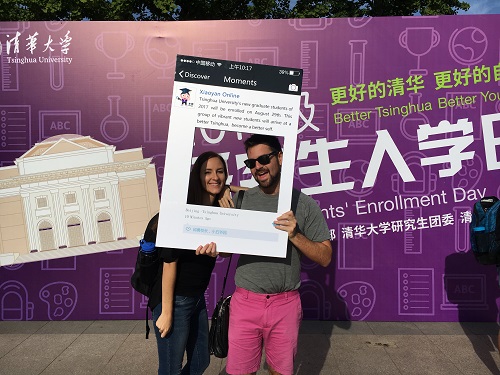
Registering for School with Fellow Tsinghua- MIT Global MBA Program Classmate Elena Blair
At Tsinghua SEM, via the Tsinghua-MIT Global MBA Program, I was able to study the foundational tenets of business management, including courses in accounting, economics, strategy, organizational behavior and much more. Drawing from the MIT Sloan core, additional classes such as “Data Models and Decisions” (DMD for short) were both challenging and rewarding. Furthermore, Tsinghua’s China-focused classes provided an unparalleled lens to better understand contemporary China - with a favorite class being
“Global Technology Strategy” taught by McKinsey partner Christopher Thomas.
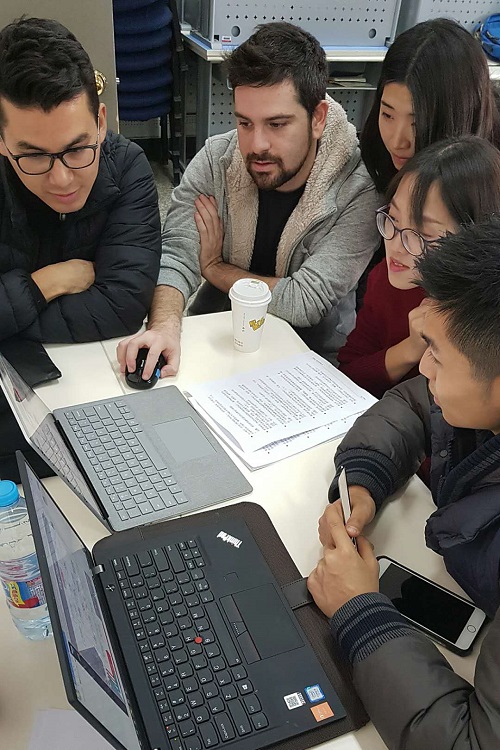
Problem Solving with Tsinghua Classmates
Projects, and especially group projects, provided an invaluable platform to not only engage in action learning, but also better interact, understand and work side-by-side with classmates from around the globe. For instance, for the Integrated Practical Project (IPP), we worked with JP Morgan Hong Kong to help identify key trends and rising companies in select sectors in China. My team, consisting of myself, two classmates from Chinese mainland and one from Mexico, worked tirelessly consulting experts, conducting research and contacting entrepreneurs to fully grasp the target landscape.
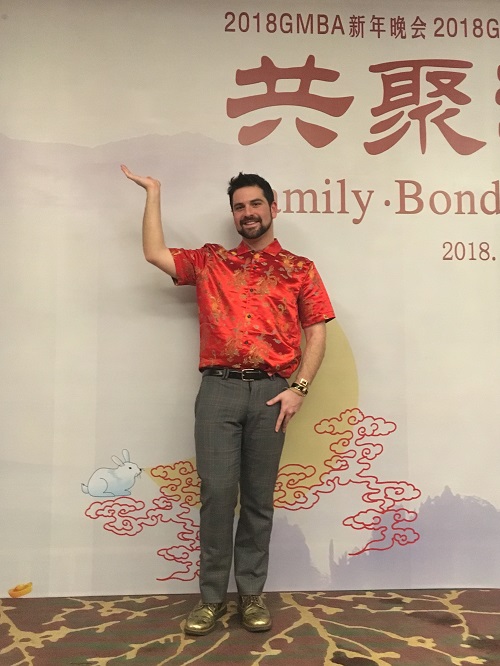
At the Tsinghua- MIT Global MBA Program Winter Gala
The academic environment at Tsinghua mirrors my experience at Edmund A. Walsh School of Foreign Service Georgetown University in Washington D.C., where I did my undergraduate studies, focusing on international relations, Asian regional studies, and the Chinese Internet. At both institutions, the thirst for knowledge is palpable. Professors and peers alike pushed me to produce my best work.
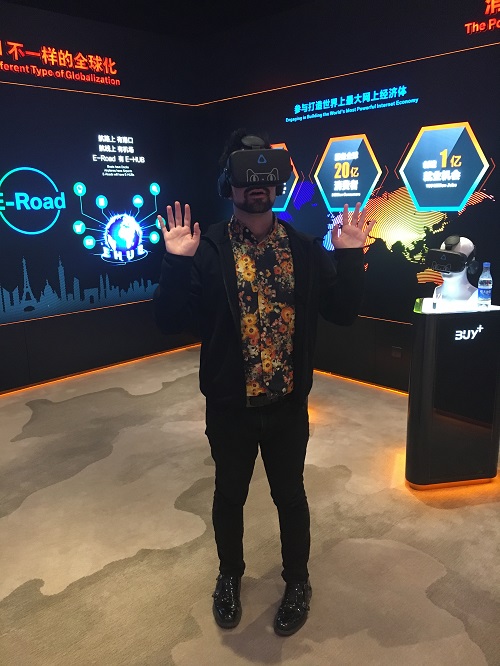
Experiencing VR Shopping at the Alibaba Offices in Beijing
Special to Tsinghua is the vibrant city of Beijing and nearby Zhongguancun, which some have dubbed the “Silicon Valley” of China. Our cohort was lucky to visit the offices of some of the best innovative and exciting Chinese tech companies today, including trips to the halls of Alibaba, Xiaomi and JD.com in Beijing. The visit to Alibaba was particularly memorable - with an VR headset in the lobby that allowed users to shop and engage with products in the virtual space.
Of course, I would be remiss not to mention the actual campus of Tsinghua itself. As a respite from studying, the grounds of Tsinghua are absolutely stunning - from the jaw-dropping Chinese classical architecture in the Jinchun Garden (近春园) area, that used to be a part of the Summer Palace, to newly built Tsinghua Art Museum, which stands as a marvel of modern architecture. Tsinghua, too, has numerous cafeterias - and many happy moments were shared eating spicy hot pot (麻辣香锅) and dumplings (水饺) with friends.
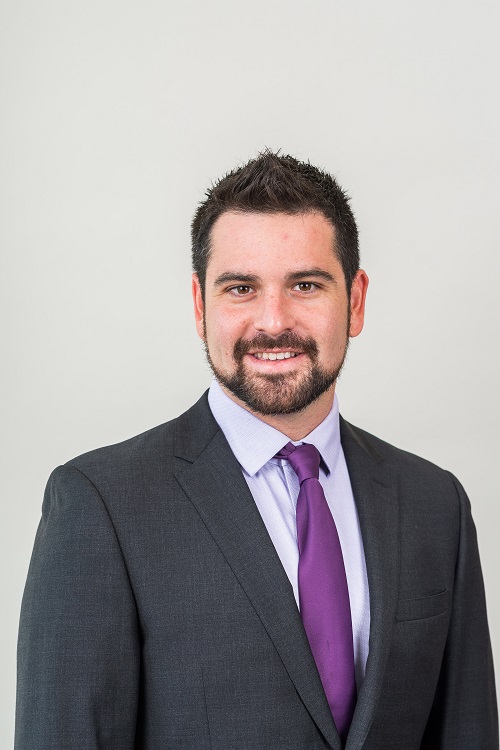
Photo Day at MIT Orientation
Inspired by the academic challenges at Tsinghua, I wanted to push myself further, and thus choose to pursue the dual MSMS (Masters of Science in Management Studies) degree at MIT. Spending my second year in Boston, via the Tsinghua MBA-MIT Master of Science in Management Studies Dual Degree Program, I honed in on strategy, product and finance classes, taking wonderful courses such as Network Theory and Analysis with Sinan Aral, Advanced Strategic Management with Michael Cusumano, and Digital Product Management with Vivek Farias.
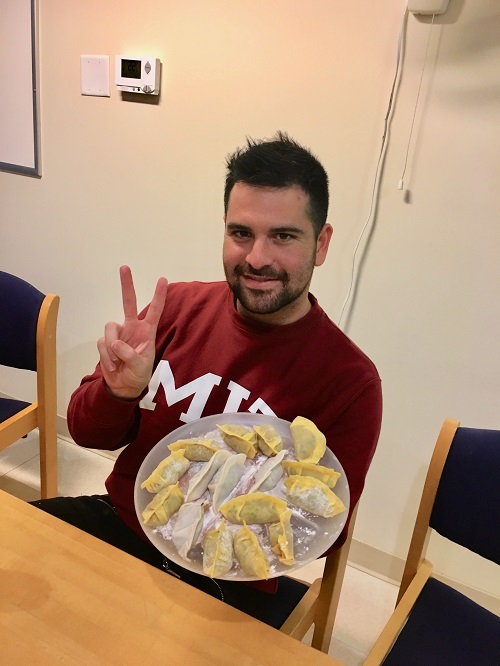
Making Dumplings for Chinese New Year in Boston
As MSMS students, one can take all the electives offered at MIT Sloan together with MBA and other Masters and PhD students, since the MSMS program functions as the second year of MIT’s MBA curriculum.
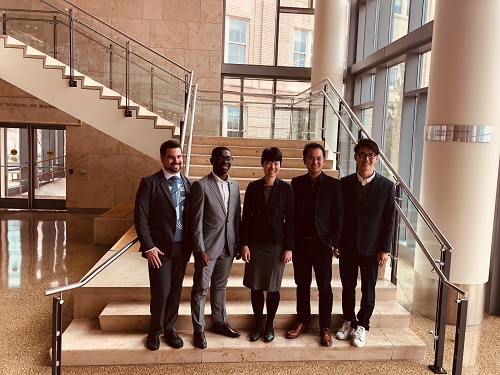
The MIT MSMS 2019 Classmates
As a culmination of my academic learning and the end points of the Tsinghua and MIT degrees, I embarked on writing a master’s thesis for each institution. For Tsinghua, I explored U.S.-China venture capital networks in the retail technology space, and the implications for this industry given the respective network structures. For MIT, I explored the U.S.-China technology dynamic as it related to cybersecurity policy and international marketing strategies in the cloud computing sector.
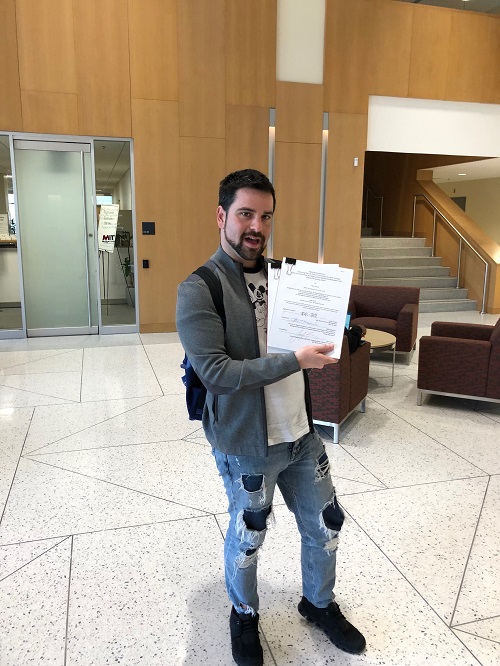
Turning In My MIT Thesis
Prior to Tsinghua, I worked in the U.S.-China e-commerce sector for approximately four years. At a certain point, I embarked on my own entrepreneurial venture, founding the Julien Isaacs U.S.-China Global Brand Consultancy firm, providing businesses looking to broaden their international presence with market entry analysis, product roadmapping and comprehensive digital strategy, working with clients such as Steve Madden China, Magiclinks and Yamibuy.
Post-graduation, I am headed to Pitney Bowes as a Senior Product Manager, working on their international e-commerce initiative, with specific touch points on their China business. I feel well-prepared from the road ahead, enabled by my time at Tsinghua and MIT, which has taught me how to think innovatively, analyze critically and be open to new possibilities. Moreover, the experiences have imbued me with a new level of cultural and technological understanding.
厚德载物
With great virtue one can change the world
This Chinese idiomatic phrase, or “chengyu” (成语), refers to the importance of ethics and social responsibility in terms of bettering the world, in my case the U.S.-China economic-political sphere. In order to best serve as a conduit for U.S.-China “business diplomacy” in the future, my experiences at Tsinghua have equipped me not only with best-in-class knowledge with respect to cross-border enterprise management and growth, but also with a strong moral compass to best drive future decisions impacting the overall socio-cultural well-being of U.S. and China in a benevolent, mutually beneficial direction. I believe that both these sensibilities were refined during my time at Tsinghua, better allowing me to simultaneously realize my own long-term goals and serve as a future leader in the U.S.-China international business community.